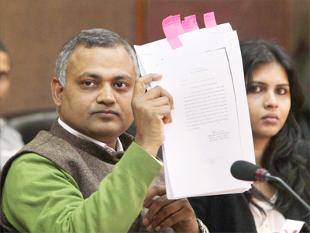 New Delhi, Jan 23: Delhi Law Minister Somnath Bharti must be sacked, BJP today said as pressure mounted on Chief Minister Arvind Kejriwal for action against his controversial ministerial colleague.
New Delhi, Jan 23: Delhi Law Minister Somnath Bharti must be sacked, BJP today said as pressure mounted on Chief Minister Arvind Kejriwal for action against his controversial ministerial colleague.
"...Somnath Bharti must be sacked. He has got no moral constitutional right to remain in office even for a moment," BJP leader Ravishankar Prasad said a day after an African woman identified him as allegedly heading a group of assaulters in a mid-night raid in south Delhi.
Bharti was involved in a row with the police last week when they refused to raid an alleged drug and prostitution racket.
One of the African women, who recorded her statement before a magistrate, had said she identified Bharti as having led the group that barged into her house and attacked them.
Various women rights activists and Delhi Commission for Women have sought action against Bharti for allegedly taking law into his hands.
Prasad also alleged match-fixing between Aam Aadmi Party (AAP) and Congress, which is giving outside support to the Kejriwal government, to stop Narendra Modi's journey to the Prime Minister's post.
"I would say there is a fixed match between AAP and the Congress party to somehow stop Narendra Modi. ...But I could never imagine the bubble of aam aadmi would burst soon," said Prasad, who is deputy leader of BJP in Rajya Sabha.





Comments
Add new comment